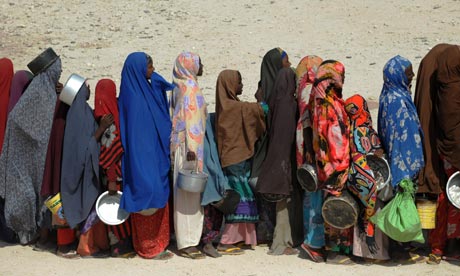
Somalis at a refugee camp in Mogadishu. There are reports of food aid being stolen and resold in markets nearby. Photograph: Roberto Schmidt/AFP/Getty Images
Thousands of sacks of food aid meant for famine victims are being stolen and sold at markets in neighbourhoods where children in refugee camps do not have enough to eat.
The UN's World Food Programme (WFP) acknowledged it had been investigating food theft in Somalia for two months. WFP officials said the "scale and intensity" of the famine crisis did not allow for a suspension of assistance, which would lead to "many unnecessary deaths".
And the aid is not even safe once it has been distributed to families huddled in the makeshift camps popping up around the capital. Families at the government-run Badbado camp said they were often forced to hand back aid after journalists had taken photos of them with it.
Ali Said Nur said he received two sacks of maize twice, but each time was forced to give one to the camp leader.
"You don't have a choice. You have to simply give without an argument to be able to stay here," he said.
The UN says more than 3.2 million Somalis – nearly half the population – need food aid after a severe drought that has been complicated by Somalia's long-running war. More than 450,000 Somalis live in famine zones controlled by militants linked to al-Qaida, where aid is difficult to deliver. The US says 29,000 Somali children under the age of five have already died.
Officials have expected some of the food aid pouring into Somalia to go missing. But the sheer scale of the theft taking place calls into question aid groups' ability to reach starving people. It also raises concerns about the willingness of aid agencies and the Somali government to fight corruption, and whether diverted aid is fuelling the country's 20-year-civil war.
"While helping starving people, you are also feeding the power groups that make a business out of the disaster," said Joakim Gundel, head of Katuni Consult, a Nairobi-based company that evaluates international aid efforts in Somalia. "You're saving people's lives today so they can die tomorrow."
The WFP Somalia director, Stefano Porretti, said the agency's system of independent, third-party monitors uncovered allegations of possible food diversion. But he underscored how dangerous the work is: WFP has had 14 employees killed in Somalia since 2008.
"Monitoring food assistance in Somalia is a particularly dangerous process." In Mogadishu markets, vast piles of food sacks are for sale with stamps on them from the WFP, the US government aid arm USAID and the Japanese government. AP found eight sites where aid food was being sold in bulk and in numerous smaller stores. Among the items being sold were corn, grain and Plumpy'nut – a specially fortified peanutbutter designed for starving children.
An official in Mogadishu with extensive knowledge of the food trade said he believed a massive amount of aid was being stolen – perhaps up to half of aid deliveries – by unscrupulous businessmen. The percentage had been lower, he said, but the flood of aid into the capital in recent weeks with little or no controls had created a bonanza for businessmen.
At one of the sites for stolen food aid, about a dozen corrugated iron sheds are stacked with sacks. Outside, women sell food from 50kg (110lb) sacks, and traders load the food on to carts or vehicles in full view of local officials.




















































